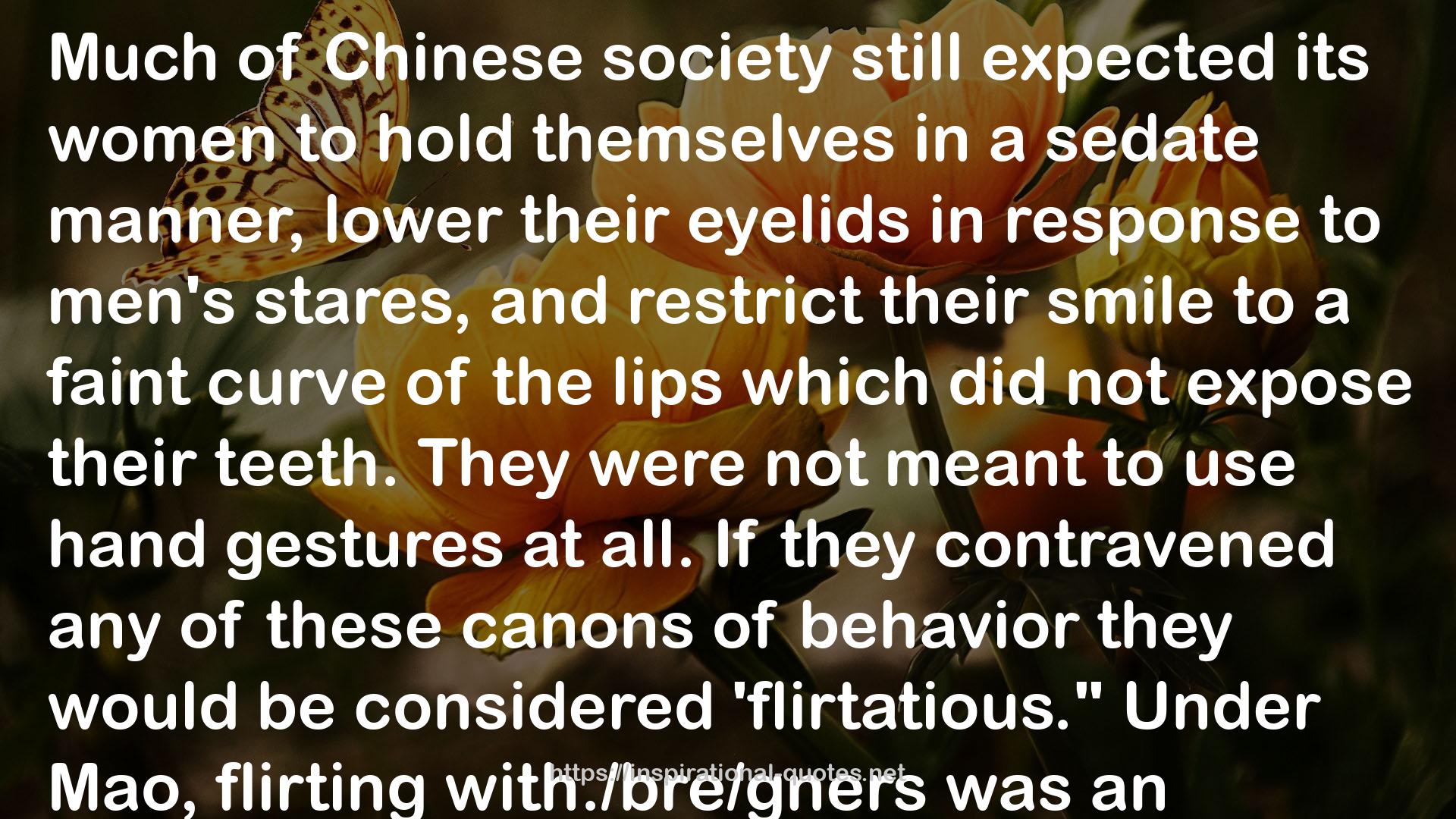" Much of Chinese society still expected its women to hold themselves in a sedate manner, lower their eyelids in response to men's stares, and restrict their smile to a faint curve of the lips which did not expose their teeth. They were not meant to use hand gestures at all. If they contravened any of these canons of behavior they would be considered 'flirtatious." Under Mao, flirting with./bre/gners was an unspeakable crime.
I was furious at the innuendo against me. It had been my Communist parents who had given me a liberal upbringing.
They had regarded the restrictions on women as precisely the sort of thing a Communist revolution should put an end to. But now oppression of women joined hands with political repression, and served resentment and petty jealousy.
One day, a Pakistani ship arrived. The Pakistani military attache came down from Peking. Long ordered us all to spring-clean the club from top to bottom, and laid on a banquet, for which he asked me to be his interpreter, which made some of the other students extremely envious. A few days later the Pakistanis gave a farewell dinner on their ship, and I was invited. The military attache had been to Sichuan, and they had prepared a special Sichuan dish for me. Long was delighted by the invitation, as was I. But despite a personal appeal from the captain and even a threat from Long to bar future students, my teachers said that no one was allowed on board a foreign ship.
"Who would take the responsibility if someone sailed away on the ship?" they asked. I was told to say I was busy that evening.
As far as I knew, I was turning down the only chance I would ever have of a trip out to sea, a foreign meal, a proper conversation in English, and an experience of the outside world.
Even so, I could not silence the whispers. Ming asked pointedly, "Why do foreigners like her so much?" as though there was something suspicious in that. The report filed on me at the end of the trip said my behavior was 'politically dubious."
In this lovely port, with its sunshine, sea breezes, and coconut trees, every occasion that should have been joyous was turned into misery. I had a good friend in the group who tried to cheer me up by putting my distress into perspective. Of course, what I encountered was no more than minor unpleasantness compared with what victims of jealousy suffered in the earlier years of the Cultural Revolution. But the thought that this was what my life at its best would be like depressed me even more.
This friend was the son of a colleague of my father's.
The other students from cities were also friendly to me. It was easy to distinguish them from the students of peasant backgrounds, who provided most of the student officials. "
Image for Quotes

I was furious at the innuendo against me. It had been my Communist parents who had given me a liberal upbringing.
They had regarded the restrictions on women as precisely the sort of thing a Communist revolution should put an end to. But now oppression of women joined hands with political repression, and served resentment and petty jealousy.
One day, a Pakistani ship arrived. The Pakistani military attache came down from Peking. Long ordered us all to spring-clean the club from top to bottom, and laid on a banquet, for which he asked me to be his interpreter, which made some of the other students extremely envious. A few days later the Pakistanis gave a farewell dinner on their ship, and I was invited. The military attache had been to Sichuan, and they had prepared a special Sichuan dish for me. Long was delighted by the invitation, as was I. But despite a personal appeal from the captain and even a threat from Long to bar future students, my teachers said that no one was allowed on board a foreign ship.
"Who would take the responsibility if someone sailed away on the ship?" they asked. I was told to say I was busy that evening.
As far as I knew, I was turning down the only chance I would ever have of a trip out to sea, a foreign meal, a proper conversation in English, and an experience of the outside world.
Even so, I could not silence the whispers. Ming asked pointedly, "Why do foreigners like her so much?" as though there was something suspicious in that. The report filed on me at the end of the trip said my behavior was 'politically dubious."
In this lovely port, with its sunshine, sea breezes, and coconut trees, every occasion that should have been joyous was turned into misery. I had a good friend in the group who tried to cheer me up by putting my distress into perspective. Of course, what I encountered was no more than minor unpleasantness compared with what victims of jealousy suffered in the earlier years of the Cultural Revolution. But the thought that this was what my life at its best would be like depressed me even more.
This friend was the son of a colleague of my father's.
The other students from cities were also friendly to me. It was easy to distinguish them from the students of peasant backgrounds, who provided most of the student officials." style="width:100%;margin:20px 0;"/>